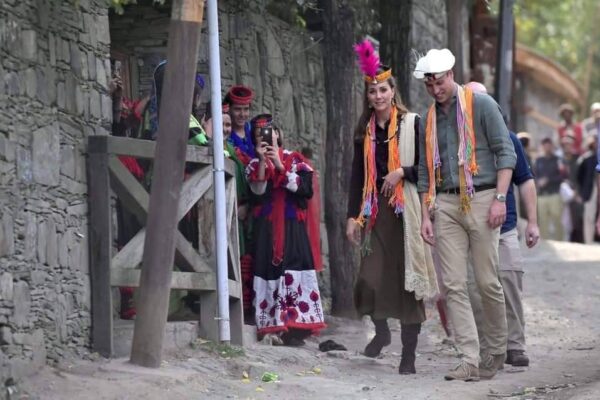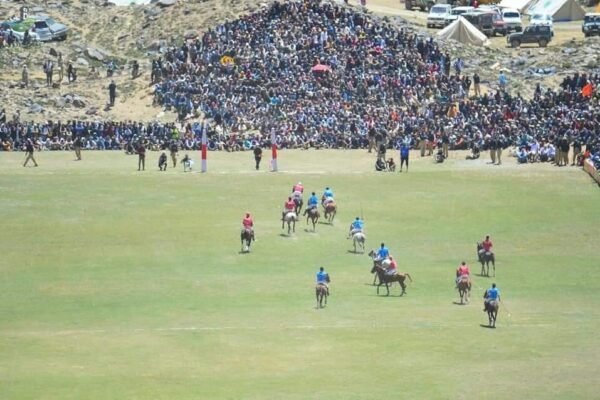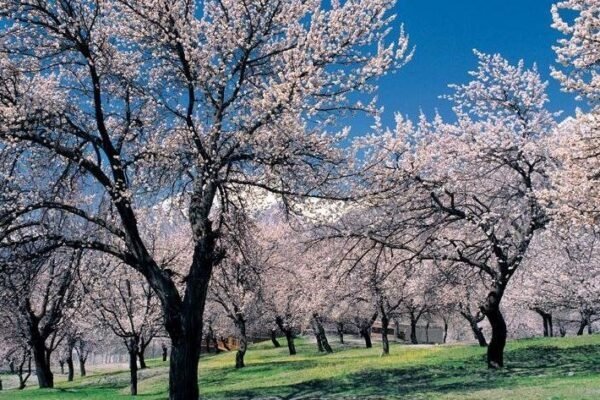Kalash Valley Festivals-Chilum-Uchal
World Famous Kalash Valley Festivals
The Kalasha people celebrate the Kalash festivals. The Kalasha people live in Pakistan’s Kalash valley. The Kalash festival is held three times a year, in the spring, summer, and winter. Chilam Joshi is a spring festival that begins around May 13th. The Uchal festival, which begins on August 20, is a summer festival. Choimus Festival, which begins on December 15, is a winter festival. People not only drink, dance, and have a good time during the festival, but they also worship their Gods and spirits, making offerings and even sacrifices. Young men and women also choose their future husbands and wives during this festival.
| Kalash Valley Festivals and Dates | No. of Days | Price |
|---|---|---|
| Chilam Joshi Festival (Kalash spring festival) 12 -18 May | 8 Dyas/Nights | 880 $ (175,000) |
| Festival of Uchal (Kalash summer festival) - 19-25 August | 7 Days/6 Nights | 1070 $ (215,000) |
| Festival of Choimus (Kalash winter festival) - 15-21 December | 6 Days/5 Nights | US$820 (155,000) |
| Kalash Valley Tour - 10 days Groupe Package 2-15 Person | 10 Days/09 Nights | 1,290 $ |
| Shandur Polo Festival | 9 Days/8 Nights | 1140$ |
| Chitral Gilgit Hunza North Pakistan Tour Package | 12Days/11 Nights | 1380$ |
We have been organizing tours to the Kalash Valley to witness the Kalash festival for 10 years. We operate 8–10-day private and solo group tours to Kalash. All our festival tours and other Tour Packages in Pakistan are on a full-board basis. The duration may be longer or shorter depending on your available time and travel requirements. We strongly believe that the Kalash festival tour is one of the top cultural retreats of the world. This beautiful valley and the friendly Kalasha people will make your holiday a once-in-a-lifetime journey. see List of Hotels in Chitral
Kalash Festival Dates Every Years
People of Kalash celebrate their festivals three times a year.
- Spring festival (Chilam Joshi festival) (May 13-16)
- Summer Festival (Uchal festival) (August 20-21)
- Winter Festival (Choimus festival). (December 15-16)
- Shandur Polo Festival (July 18-20)
Spring festival – Chilam Joshi festival
Spring festival is also know as the Chilam Joshi festival. People of Kalash celebrate four days across all Kalash valleys. Spring festival begins with “Milk day”. Ten days prior to the festival, they store milk from their households. The people of Kalash offer their libations during this event. The festival reflects their unique cultural richness, the harmony in their society, and their message of peace to the world. They ask for blessings from their God and pray for a prosperous year of agriculture and the health and safety of their herds. During this festival, Kalashi men and women also chose their life patterns. During the Kalash festival, women wear traditional attire with lively colors, and their dresses have patterns of flowers on it. They wear beaded necklaces, which complement their dresses and head gear.
Men wear traditional Shalwar Kameez with a wool waistcoat. They dance together and sing in a valley tribe, as it gives them an opportunity to choose their life partners and announce their names on the last day of the festival.
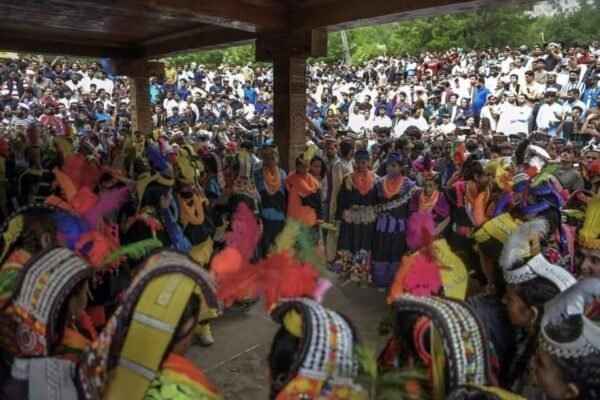
Kalash Summer festival: ( Uchal festival)
The people of Kalash celebrate the arrival of summer in their own way. The summer festival is very popular among the Kalasha people. In recent years, this festival has also gained popularity all around the world. People from different parts of Pakistan and international tourists attend the summer festival in large numbers. During the festival, Kalasha people pay homage to their God by celebrating the harvest and also thanking their God for blessing them with good food and crops. Kalash people take a procession to a high plateau outside the village in Balangkuru and pray to their God. After the prayers, the night-long dance and party begin, which last until the early hours of the morning. The summer festival is celebrated in all the valleys for several days.
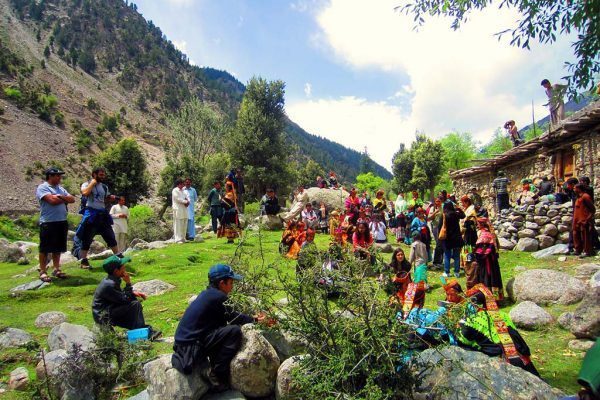
Kalash Winter festival – ( Choimus Festival)
Kalash Winter Festival is also called “Choimus” in the local language. This annually observed event symbolizes and forecasts the prosperity of the village and its people in the coming year. During the festival, people go out to seek foxes which is considered a good omen. Torch lit processions arrives from nearby villages at the main traditional dancing place called a “Charsue”. The dancing and festivities are held indoors and go late into the night as the local wine is handed around the bonfire. The locals perform rituals for purification during the festival at the dawn of the new year. The tribal elders gather at hilltops to watch the rising sun of the new year, which is followed by goat sacrifices made to the goddess “Jastak,” and the blood is sprinkled at the temple Jastarkhan.We believe that visiting Kalash valley and experiencing the “Kalash festival” will create a life long memory which will stay with you for a long time
Shandur Polo Festival
This is the highest polo stadium in the world, at 3,734 meters above sea level, set in a stunning landscape of rolling pastures, azure lakes, and the Hindu Raj Mountains; it is the location for local polo matches

Kalash Valley In Chitral – Home to a Pagan culture in Pakistan
How to Reach Chitral Kalash Valley:
The easiest way to reach Chitral Valley is by taking a flight from Islamabad to Chitral and then traveling by road. There are several buses and taxis available from Chitral to Kalash Valley, which is approximately a 1-2 hour drive.or By Road From Islamabad to Via Swat we will reach in hunza 9 to 12 Hours
People Of Chitral Kalash Valley:
The people of Kalash are considered unique among the people of Pakistan. The Kalasha or Kalash, also called Waigali or Wai, are a Dardic Indo-Aryan indigenous people residing in the Chitral District of Khyber-Pakhtunkhwa province of Pakistan. They speak the Kalasha language, from the Dardic family of the Indo-Aryan branch. They are considered unique among the people of Pakistan. They are also considered to be Pakistan’s smallest ethno religious, practicing a religion which some authors characterize as a form of animism, while academics classify it as “a form of ancient Hinduism”. The Kalash are considered to be an indigenous people of Asia, with their ancestors migrating to Chitral valley from another location possibly further south, which the Kalash call “Tsiyam” in their folk songs and epics.
Languages of the Chitral Valley:
Language of Kalash people: The Kalasha language, also known as Kalasha-mun, is a member of the Dardic group of the Indo-Aryan languages. Its closest relative is the neighboring Khowar language. Kalasha was formerly spoken over a larger area in south Chitral, but it is now mostly confined to the western side valleys having lost ground to Khowa. However, Urdu and English are also widely understood and spoken.
History of the Chitral Valley:
The grandest of all is that the Kalashas carry a romantic view of being the descendants of Alexander the Great. On the other hand, many historians believe that they are indigenous tribe of the neighboring area of Nuristan, also called Kafiristan (the land of Kafirs). It is believed that in 1895, Amir Abdul Rahman, the king of Afghanistan, conquered the area of Nuristan and forced the inhabitants of the area to convert to Islam. It was during that time that many people fled to Chitral to avoid conversion. The third theory claims that the ancestors of Kalashas migrated from a distant place in South Asia called Tsiam. The Tsiam is considered to be the traditional home of these people. The Kalasha folk songs and fables hint at the existence of Tsiam and that their roots belong in that region.
Weather in Chitral Valley:
The weather in Chitral Valley is generally mild and pleasant, with temperatures ranging from 20-25°C during the day and 5-10°C at night. However, during the winter months, the temperature can drop below freezing

